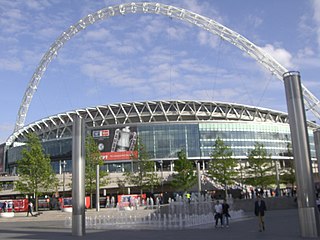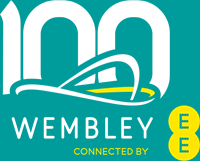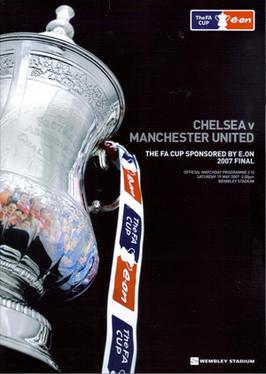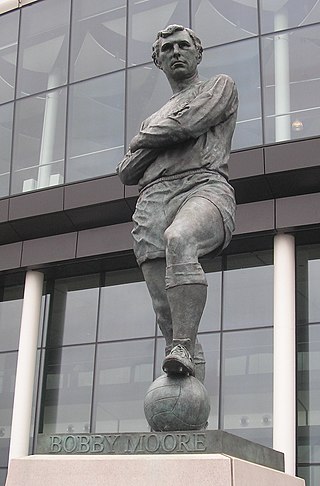
The 1966 FIFA World Cup final was a football match played at Wembley Stadium in London on 30 July 1966 to determine the winner of the 1966 FIFA World Cup, the eighth FIFA World Cup. The match was contested by England and West Germany, with England winning 4–2 after extra time to claim the Jules Rimet Trophy. It was the first – and to date only – occasion that England has hosted or won the World Cup.

The 1966 FIFA World Cup was the eighth FIFA World Cup, a quadrennial football tournament for men's senior national teams. It was played in England from 11 July to 30 July 1966. The England national football team defeated West Germany 4–2 in the final to win its first and only World Cup title. The final had finished at 2–2 after 90 minutes and went to extra time, when Geoff Hurst scored two goals to complete his hat-trick, the first to be scored in a men's World Cup final. England were the fifth nation to win the event, and the third host nation to win after Uruguay in 1930 and Italy in 1934. World champions Brazil failed to go past the group stage, as they were defeated by Hungary and Portugal.

The original Wembley Stadium was a football stadium in Wembley, London, best known for hosting important football matches. It stood on the same site now occupied by its successor.

Sir Alfred Ernest Ramsey was an English football player and manager. As a player, he represented the England national team and captained the side, but he is best known for his time as England manager from 1963 to 1974, which included guiding them to victory in the 1966 FIFA World Cup. Knighted in 1967 in recognition of the World Cup win, Ramsey also managed his country to third place in the 1968 European Championship and the quarter-finals of the 1970 World Cup and the 1972 European Championship. As a player, Ramsey was a defender and a member of England's 1950 World Cup squad.

Martin Stanford Peters was an English footballer and manager. As a member of the England team which won the 1966 FIFA World Cup, he scored the second of England's four goals in the final against West Germany. He also played in the 1970 World Cup. Born in Plaistow, Essex, he played club football for West Ham United, Tottenham Hotspur, Norwich City and Sheffield United. He briefly managed Sheffield United before retiring from professional football in 1981.

Stamford Bridge is a football stadium in Fulham, adjacent to the borough of Chelsea in West London. It is the home of Premier League club Chelsea. With a capacity of 40,341, it is the ninth largest venue of the 2022–23 Premier League season and the eleventh largest football stadium in England.

White Hart Lane was a football stadium in Tottenham, North London and the home of Tottenham Hotspur Football Club from 1899 to 2017. Its capacity varied over the years; when changed to all-seater it had a capacity of 36,284. The stadium was fully demolished after the end of the 2016–17 season.

Wembley Park is a district of the London Borough of Brent, England. It is roughly centred on Bridge Road, a mile northeast of Wembley town centre and 7.6 miles (12 km) northwest from Charing Cross.

The FA Cup Final, commonly referred to in England as just the Cup Final, is the last match in the Football Association Challenge Cup. It has regularly been one of the most attended domestic football events in the world, with an official attendance of 89,472 at the 2017 final. The 2020 event has been the exception, due to the Coronavirus pandemic. The Final is the culmination of a knockout competition among clubs belonging to The Football Association in England, although Scottish and Irish teams competed in the early years and Welsh teams regularly compete, with Cardiff City winning the Cup in 1927 and reaching the final in 1925 and 2008. Since 1923 it has been played mostly at Wembley Stadium.

Wembley Stadium is a football stadium in Wembley, London. It opened in 2007 on the site of the original Wembley Stadium, which was demolished from 2002 to 2003. The stadium hosts major football matches including home matches of the England national football team, and the FA Cup Final. Wembley Stadium is owned by the governing body of English football, the Football Association, whose headquarters are in the stadium, through its subsidiary Wembley National Stadium Ltd (WNSL). With 90,000 seats, it is the largest stadium in the UK and the second-largest stadium in Europe.

The 2007 FA Cup final was played on Saturday, 19 May 2007 between Chelsea and Manchester United. It was the 126th FA Cup Final and the first to be played at the new Wembley Stadium. Chelsea beat Manchester United 1-0 thanks to an extra-time goal from Didier Drogba, completing a domestic cup double for the Blues in the 2006–07 season, as they had already won the League Cup Final in February. Manchester United were favourite for winning a double of their own as they had recently beaten Chelsea to the Premier League title two weeks earlier. The game was widely considered to be a disappointment by pundits and fans alike. As a result of Manchester United and Chelsea having already been guaranteed qualification for the UEFA Champions League, the UEFA Cup entry for the FA Cup winner/runner-up went instead to the highest positioned Premier League team who had not already qualified for Europe: Bolton Wanderers.

England v Germany (2000) was the final match to be played at the old Wembley Stadium. The match was a 2002 World Cup qualifying game between England and Germany. Germany won the game 1–0, with the goal scored by Dietmar Hamann. England manager Kevin Keegan resigned from his position after this game. The return fixture in Munich, Germany, resulted in a 5–1 victory to England with Swedish Sven-Göran Eriksson as new England manager.
The 1993–94 FA Cup was the 113th staging of the world and England's oldest cup competition, the Football Association Cup or FA Cup. The competition overall was won by Manchester United for the first time since 1990, with a 4–0 thrashing of Chelsea.
The 2004–05 Football League Cup was the 45th staging of the Football League Cup, a knockout competition for England's top 92 football clubs. The competition name reflects a sponsorship deal with lager brand Carling.

Robert Frederick Chelsea Moore was an English professional footballer. He most notably played for West Ham United, captaining the club for more than ten years, and was the captain of the England national team that won the 1966 FIFA World Cup. He is widely regarded as one of the greatest defenders in the history of football, and was cited by Pelé as the greatest defender that he had ever played against.

Sir Arthur Elvin was a British businessman who was best known as the owner and operator of Wembley Stadium, London.

The Bobby Moore statue is a bronze sculpture of the former West Ham and England footballer Bobby Moore, situated directly outside England's national stadium, Wembley Stadium, in Wembley Park, north-west London. It commemorates the life of Moore, who captained the only England side ever to win the World Cup, defeating Germany 4–2 in the 1966 FIFA World Cup Final held in England at the old Wembley Stadium, demolished in 2003. Commissioned by the Football Association, it was unveiled outside the new stadium when it opened in 2007, fourteen years after Moore's death from cancer, aged 51. Standing 20 feet (6.1 m) tall on a stone plinth, it looks out over spectators as they walk down Wembley Way into the stadium. Sculpted by the Royal Sculptor Philip Jackson, it is Jackson's second piece featuring Moore, after the World Cup Sculpture unveiled in 2003.

The World Cup Sculpture, or simply The Champions, is a bronze statue of the 1966 World Cup Final located near the site of West Ham United Football Club's former Boleyn Ground stadium in the London Borough of Newham, England. It depicts a famous victory scene photographed after the final, held at the old Wembley Stadium in London, featuring Bobby Moore, Geoff Hurst, Martin Peters and Ray Wilson. It remains the only time the England national football team have won the World Cup, and England captain Moore is pictured held shoulder high by his colleagues, holding the Jules Rimet Trophy aloft.

The 1923 FA Cup final was an association football match between Bolton Wanderers and West Ham United on 28 April 1923 at the original Wembley Stadium in London. The showpiece match of English football's primary cup competition, the Football Association Challenge Cup, it was the first football match to be played at Wembley Stadium. King George V was in attendance to present the trophy to the winning team.
Marks Barfield Architects is a London-based architectural firm founded by husband and wife David Marks and Julia Barfield. Their work has included the London Eye, the treetop walkway in Kew Gardens, the i360 observation tower in Brighton, England and Cambridge Mosque.


















